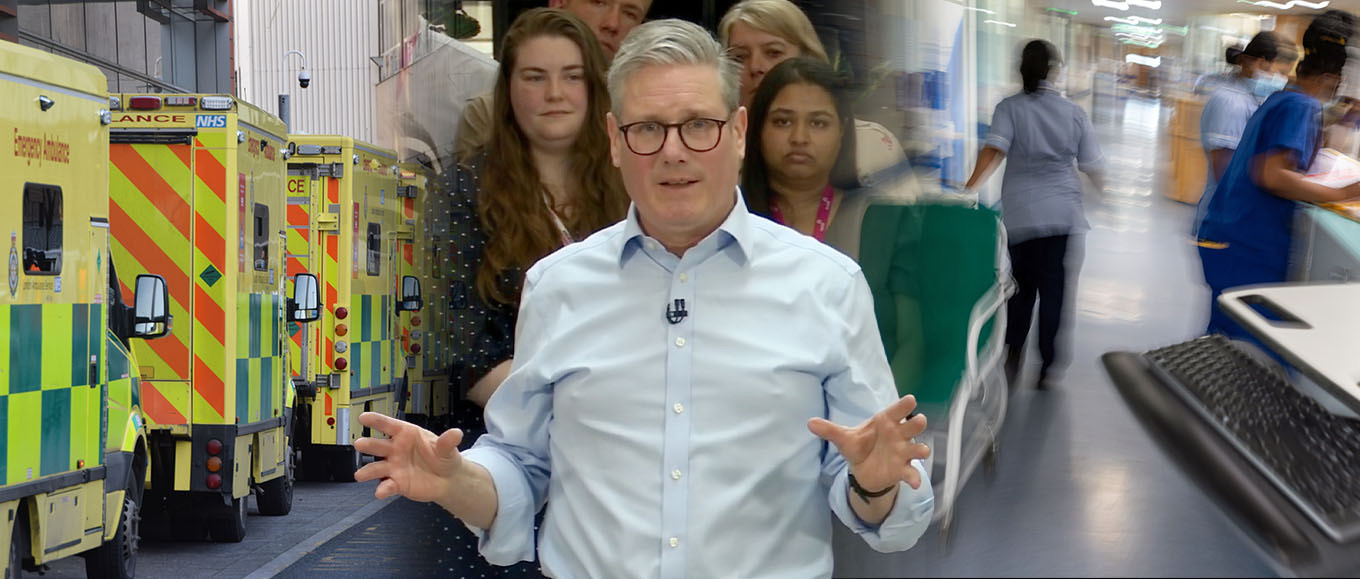THE WORLD’s biggest quango – NHS England – will be abolished in a bid to cut red tape and “free up” cash for front line services, Sir Keir Starmer has announced.
Up to 10,000 jobs will be axed, with plans in place to reduce the overall workforce across the agency and the Department for Health by 50 per cent.
The PM said the move will put the NHS “back at the heart of Government where it belongs”.
Health Secretary Wes Streeting added it will result in “hundreds of millions of pounds in savings”.
His comments came as he delivered a speech in Yorkshire on reshaping the “flabby” state and slashing the cost of bureaucracy.
NHS England is the world’s biggest quango – an unelected body in charge of managing England’s health service.

Sir Keir Starmer said he can’t explain to the British people why they should spend money on ‘two layers of bureaucracy’
Credit: PA

NHS England controls a whopping £200billion-a-year budget (file image)
Credit: Getty
Set up in 2013, it controls a whopping £200billion-a-year budget, overseeing hospitals, GPs and healthcare across the country.
Unveiling the move, the PM said: “In Government there was a clear moment when the Tories crossed the Rubicon – it was early, and it was decisive and it sent a signal across Whitehall that was never undone.
“So today I’m going to reverse it because I don’t see why decisions about £200billion of taxpayer money on something as fundamental to our security as the NHS should be taken by an arms-length body, NHS England.
“And I can’t in all honesty explain to the British people why they should spend their money on two layers of bureaucracy.
“That money could and should be spent on nurses, doctors, GP appointments.
“So today I can announce we’re going to cut bureaucracy across the state… I’m bringing management of the NHS back under democratic control by abolishing the arms-length body NHS England.
“That will put the NHS at the heart of government, where it belongs.”

Health Secretary Wes Streeting said the move would mean ‘hundreds of millions of pounds in savings’
Credit: Getty
In the Commons, Mr Streeting blasted the NHS for delivering “worse care for patients” but being “more expensive than ever”.
The Health Secretary said the budget for NHS England’s 15,000 staff and admin alone “has soared to £2billion”.
Mr Streeting hit out at being “left with two large organisations doing the same roles with an enormous amount of duplication”.
Answering a question from a cancer patient on how the decision would improve NHS services, Sir Keir said: “Amongst the reasons we are abolishing it is because of the duplication.
“So, if you can believe it, we’ve got a communications team in NHS England, we’ve got a communications team in the health department of government.
“We’ve got a strategy team in NHS England, a strategy team in the government department.
“We are duplicating things that could be done once.
“If we strip that out, which is what we are doing today, that then allows us to free up that money to put it where it needs to be, which is the front line.”
He added that the Government wanted to push power to frontline workers “and away from the bureaucracy which often holds them up”.
The major shake-up will see NHS England’s functions absorbed by the Department of Health and Social Care.
Health Secretary Wes Streeting blasted the existing set-up, saying: “This is the final nail in the coffin of the disastrous 2012 reorganisation, which led to the longest waiting times, lowest patient satisfaction, and most expensive NHS in history.
“When money is so tight, we can’t justify such a complex bureaucracy with two organisations doing the same jobs.
“We need more doers, and fewer checkers, which is why I’m devolving resources and responsibilities to the NHS frontline.”
Sir James Mackey, incoming NHS England boss, admitted the reforms might feel “unsettling” but promised they’ll deliver “the biggest bang for our buck” by getting cash directly into frontline care.
The shake-up will immediately start moving NHS England’s duties back under direct ministerial control, with the Government saying it will save hundreds of millions a year to tackle waiting lists and boost patient care.
The move comes amid growing pressure on the Government to tackle spiralling waiting times, improve patient satisfaction, and restore public confidence in the NHS.
This month, Mr Streeting also announced staff numbers at NHS headquarters will be halved as part of an overhaul.
A further three senior board members also announced they will resign at the end of March, joining chief executive Amanda Pritchard and its most senior doctor, Prof Sir Stephen Powis, in an exodus.
Having initially planned to reduce the number of central office workers at NHS England by about 15 per cent, an updated announcement said it would now be 50 per cent.
Elsewhere during his speech, the Prime Minister said that “strength abroad” demands “security back at home,” saying the Government must go “further and faster” in delivering reform.
He said: “Given what’s happening globally, given the insecurity in our country, now is the time, in my belief, for greater urgency and to go further and faster on what we need to do on security and renewal,” he said.
“So every pound that we spend, every regulation, every decision must deliver for working people. And I don’t just mean efficiency, although doing what you’re doing, you’ll know how important efficiency is.
“I mean something else which is allowing the state, the Government, to operate what I call maximum power.
“So, reforming it so it’s closer to its communities, tearing down the walls of Westminster, inviting the British people in as partners in the business of change.”



















